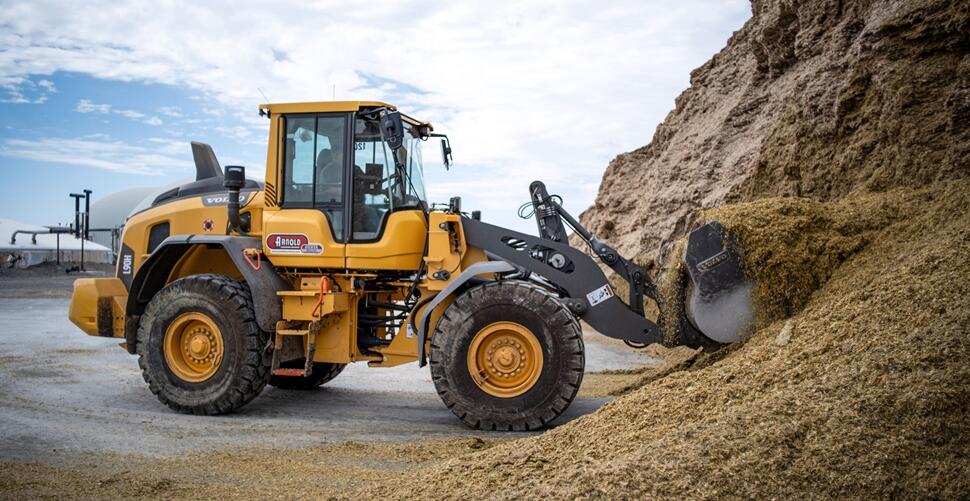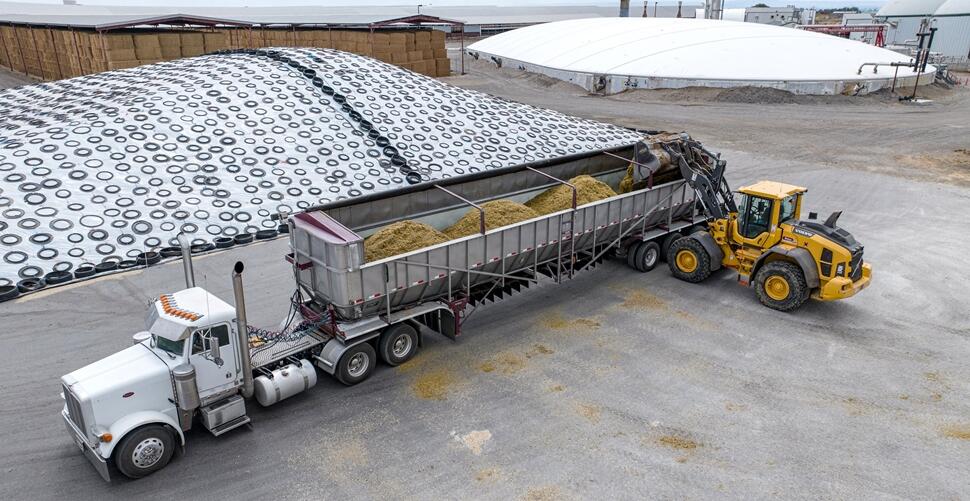Dairy Swaps Loader Upkeep for Guaranteed Uptime With Equipment as a Service

The dairy industry has evolved over centuries, so it only makes sense that today’s most successful dairy operations are the ones that adapt and take advantage of new ways to work. Idaho’s largest dairy operation, Bettencourt Dairies, is a prime example. What began with 17 cows in 1982 is now a nine-location company with 65,000 cows and 600 employees.
This impressive growth has required hard work, flexibility and open-mindedness. Advancements in herd health management, milking technologies and the facilities where it all happens have kept the Bettencourt team on their toes.
But a less obvious evolution — the way the company acquires and maintains essential heavy equipment — is having an equally beneficial effect on their success.
Dependability by the Hour
Bettencourt Dairies relies on more than 30 mid-size wheel loaders to blend, stockpile and load animal feed, as well as to move manure, dirt and bedding. These multi-purpose machines are vital to daily operations, but juggling their service needs is no easy task.
So when a friend at their heavy equipment dealership, Arnold Machinery Company, mentioned a new procurement option that included maintenance management and basically guaranteed uptime, CFO Rick Onaindia was all ears.
“At that time, we would get leased units, and we would have to monitor the hours,” says Onaindia. “We’d have to move the units around to make sure they didn’t go over a certain hour. We had to schedule the maintenance. So the idea of a fleet program to take all that noise away was appealing.”
The Arnold team coordinated a meeting with Volvo Construction Equipment so Bettencourt could learn more about the OEM’s newest procurement and uptime solution, Equipment as a Service (EaaS).
EaaS is a long-term, fleet-based service where customers purchase hours rather than machines, and the dealer and OEM coordinate the delivery and maintenance of the equipment.
“A lot of customers call it a usage-based contract, where they pay per use,” says David Nus, head of fleet management at Volvo CE. “They pay to use the stuff — they don’t have to own the stuff. And the reason why that’s interesting for a lot of these customers is that they can focus their resources on their core business.”
That’s exactly what the Bettencourt team has done, transitioning their fleet to Volvo wheel loaders and expanding their EaaS agreement accordingly.
“We started with a few loaders — maybe 10 — and it worked out great,” says Onaindia. “We just eventually replaced all the other units. Now we’re probably 95% Volvo, and we’ll be 100% here pretty quick.”

Doing What They Do Best
As a vertically integrated operation, Bettencourt Dairies is not only milking cows. Employees also farm about 15,000 acres to support the herd, raise their own heifers and even process the milk.
While this comprehensive business model is a differentiator and point of pride, it also means that every person, tool and machine must be incredibly reliable.
“Dairy operations run 24 hours a day, seven days a week,” says Janae Hymas, branch manager of Arnold’s Twin Falls, Idaho, office. “The wheel loaders here run up to 12 to 14 hours a day, so maximizing uptime and availability is very important.”
To make sure that happens, Hymas works closely with the Bettencourt team and her contacts at Volvo CE to ensure that their EaaS agreement is well-executed.
“We hold regular meetings to discuss fleet management, productivity, how we can minimize downtime,” says Hymas. “Volvo always supports the dealership and customer in any way they can.”
Will Burns, a fleet management business analyst at Volvo CE, says weekly calls with at least one person from the OEM, dealer and customer ensure that the wheel loader fleet stays running.
“We’re taking a look at the hours on the machines, we’re tracking maintenance, we’re handling repairs,” says Burns. “They can focus on being a dairy and leave the equipment up to people that do equipment.”
And according to Onaindia, that’s precisely what’s happening.
“Dependability, quality, servicing, reliability and transparency — all those things,” he says. “They know what our machines are doing, they know the downtime, they know the replacement issues. They’ve done what they said they’re going to do.”
EaaS Supports Production-Focused Fleets
The “as a service” model has been around for decades, working like a subscription for the use of various hardware and software products. Equipment as a Service, however, has only recently begun gaining traction.
“It’s coming into the transportation industry, and we feel in the off-road world it’s going to grow as well,” says Nus. “A lot of people will still buy machines, they’ll still rent machines, they’ll still lease machines. But Equipment as a Service will become another option for them. In the right circumstances, it has a lot of value.”
So what are those circumstances?
Nus says Volvo’s EaaS works best for customers in production environments like quarrying, mining and large-scale construction, where machines are expected to consistently work a high number of hours.
“If they have a steady need, it’s handy,” he says. “(In the contract), we guarantee the machines are available at a certain percentage in a given year. And if we fail on that guarantee, we’ll actually pay them a penalty.”
Burns says the financial structure is attractive too. The end user is not buying or leasing, so it’s not a capital expense and stays off a balance sheet. The scalable pay-as-you-go setup makes cash flow more efficient because operating costs and revenue generation are aligned.
“A lot of people are looking for a sustainable, fixed cost,” he says. “Equipment as a Service eliminates unknown repair costs, unknown maintenance costs, things like that. It’s very easy to figure out what your actual total cost is going to be.”
Nus says they begin the EaaS contract process by sitting down with the customer to understand their needs and expectations, including machine types, applications and long-term goals.
“Every business is really different; and even within industries, each customer’s organization is different,” he says. “So it’s really important for us to understand because we’ll structure the agreement around those needs.”
For Bettencourt Dairies, this means dozens of wheel loaders each running for 2,500 to 3,000 hours per year.
“We strive to have a dependable, well-maintained piece of equipment ready for work every day,” says Onaindia. With their Volvo EaaS contract, “It’s something we can take away from our day-to-day business activities and know with confidence that somebody’s going to take care of it.”

Promising Outcomes for Agriculture and Beyond
Forty-three years in, the Bettencourt Dairies team is as committed to the industry as ever. Founder and president Luis Bettencourt can often be found working right alongside his employees and making sure they have what they need to properly care for the cows.
When that involves around-the-clock feeding and facility maintenance, it’s hard to place a value on the peace of mind provided by a fleet of wheel loaders that’s always up for the job. But you won’t catch this team keeping EaaS a secret.
“The dairy community is pretty tight-knit. People know what you’re doing, and we talk a lot,” says Onaindia. “So yes, I’ve recommended for larger-scale operations that this program would be a fit for — told them our story, told them how happy we are, and there’s a lot of interest out there.”
Burns expects interest in the EaaS model to continue growing in the agriculture, construction aggregates and mining industries.
“As machines become more complicated, it kind of takes that burden off of the customer. The value is definitely there,” he says. “I definitely see it becoming more popular.”
As for Bettencourt Dairies, their EaaS contract has grown to include Volvo wheel loaders in other divisions of the company, including a breeding company and a compost company. Onaindia attributes this vote of confidence to the relationships built with their Arnold and Volvo CE contacts.
“Since I’ve been here, we’ve kind of bounced around on the equipment side of the world with different vendors, and nobody’s offered us something like this,” he says. “The ease of doing business with Arnold and Volvo together has been great. I don’t see us bouncing around anymore.”